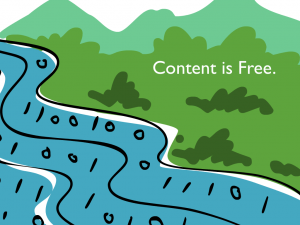 One can’t help but notice the brouhaha that Malcolm Gladwell tipped with his prominent dis-endorsement of Chris Anderson’s latest book Free.
One can’t help but notice the brouhaha that Malcolm Gladwell tipped with his prominent dis-endorsement of Chris Anderson’s latest book Free.
His New Yorker magazine review of the timely tome, which portends an age where all media content shall be set free, prompted many in the Twittersphere to weigh in (mostly in favor of Mr. Anderson’s perspective).
Here’s a smattering of what the pundits had to say starting with Mr. Gladwell:
- Malcolm Gladwell “Priced to Sell: Is Free the Future” “His advice is pithy, his tone uncompromising, and his subject matter perfectly timed for a moment when old-line content providers are desperate for answers. That said, it is not entirely clear what distinction is being marked between ‘paying people to get other people to write’ and paying people to write. If you can afford to pay someone to get other people to write, why can’t you pay people to write? It would be nice to know, as well, just how a business goes about reorganizing itself around getting people to work for ‘non-monetary rewards.’ Does he mean that the New York Times should be staffed by volunteers, like Meals on Wheels?”
- Chris Anderson “Dear Malcolm: Why So Threatened” “So that’s the difference between ‘paying people to write’ and ‘paying people to get other people to write’. Somewhere down the chain, the incentives go from monetary to nonmonetary (attention, reputation, expression, etc).
It works great for all involved. Is it the model for the newspaper industry? Maybe not all of it, but it is the only way I can think of to scale the economics of media down to the hyperlocal level. And I can imagine far more subjects that are better handled by well-coordinated amateurs than those that can support professional journalists. My business card says “Editor in Chiefâ€, but if one of my children follows in my footsteps, I suspect their business card will say “Community Manager.†Both can be good careers.
Malcolm, does this answer your question?”
- Seth Godin “Malcolm is Wrong” “I’ve never written those three words before, but he’s never disagreed with Chris Anderson before, so there you go. Free is the name of Chris’s new book, and it’s going to be wildly misunderstood and widely argued about. The first argument that makes no sense is, ‘should we want free to be the future?’ Who cares if we want it? It is.
The second argument that makes no sense is, ‘how will this new business model support the world as we know it today?’ Who cares if it does? It is. It’s happening. The world will change around it, because the world has no choice. I’m sorry if that’s inconvenient, but it’s true.”
- Mark Cuban “Free Versus Freely Distributed” “You can have it for free, if thats how you want it, but you have to come get it where we want you to get it. On our websites. On websites we co produce with Youtube or Hulu or whoever. If you want it for free, you have to go through the exhausting effort of clicking to our website and giving us something in value in return. It may be your attention. It may be your interest. It may be a referral or your email address. We give you something free, you give us something that costs you nothing.”
This debate shows no signs of abating. Last week, it was the veracity of citizen versus traditional journalists. This week it’s a continuance of the discourse on what business models can work in an age of diminished audiences, ad spends and CPMs. I guess I’ll head over to Michael’s next week to hear directly from Mr. Anderson.